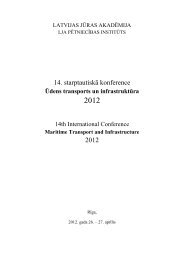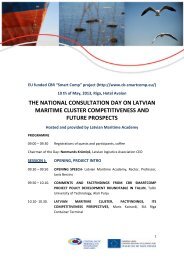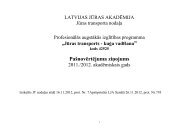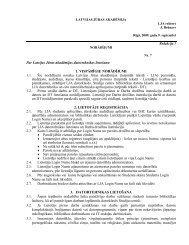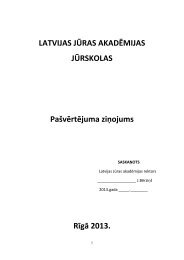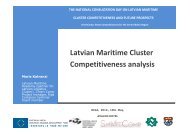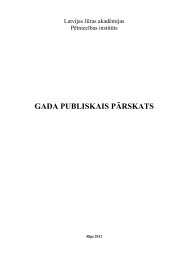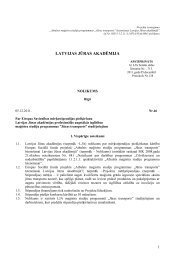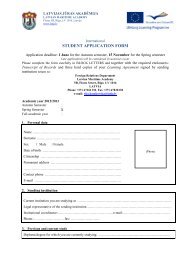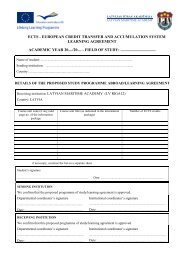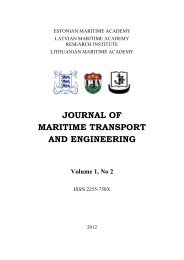Create successful ePaper yourself
Turn your PDF publications into a flip-book with our unique Google optimized e-Paper software.
E-LEARNING AND ECONOMISM IN REGARD TO THE PSYCHICHEALTH AND DEVELOPMENT OF SEAFARERS’ LEADERSHIPSaulius LileikisLithuanian <strong>Maritime</strong> Academy, 7 I. Kanto Street, Klaipėda, LT-92123, Lithuania,E-mail: s.lileikis@lajm.lt, phone: +370 46397240AbstractThe article analyses the problems of e-learning and economism in regard to the psychic health anddevelopment of future seafarers’ leadership. The research object is maritime professional development.The object has been researched at the scientific level of e-learning, economism and leadership. Theresearch goal is identification of the problems of maritime professional development from the ideologicaland psychosocial point of view of e-learning, economism and leadership. Tasks are as follows:characterization of e-learning as a problem at the level of development of psychic health of thepersonality, revelation of protestant - Calvinistic - ideology as the eventual factor of maritimeeconomism, and description of the valuable possibility of development of future seafarers’ leadership.The research methodology is based on the STCW convention, the paradigm of universal upbringing,idealism, humanism, existentialism and existential phenomenology. The universal upbringing of the futureseafarers is substantiated anthropologically and should be the main valuable direction of the maritimeeducation of leadership in regard to the seafarers’ work reality.Keywords: e-learning, economism, seafarer’s personality, psychic health, leadershipIntroductionModern maritime professional training is based on technologies and especially on e-learning. Theuse of technologies must be naturally associated with psychic health of the personality. The scientistsmaintain that over-confidence in technology-focused professional training can raise problems inprofessional development and damage the person’s health and abilities in social communication andsocialization [20]. The education policy is seen as problematic, because of its priority of e-learning. TheEU higher education conventions require the development of personality, creativity and critical thinkingin particular. This goal is almost unrealistic in case the priority is not a natural and positive relationshipwith oneself and the teacher, but rather with e-technology. This relationship, including distance learningand web-based learning, must be harmonized.Another dimension of this problem is maritime economism as an eventual historical result of theprotestant - Calvinistic - ideology. Economism depersonalizes a human. However, the seafarer is apersonality and a value of social life. The STCW convention requires training in leadership and teamwork[23]. The future seafarer must become a leader after the maritime training and development of themaritime student’s leadership. But the combination of economism and leadership in terms of the sociallyresponsible maritime business is very difficult.It is important to organize a universal upbringing of students at the higher maritime school, at thelevels of conventional requirement of social responsibility [16], and the perception of dangers of theeconomistic education in psychosocial reference to their long-term professional development. TheEuropean history knows a threat of misanthropic personalities at individual and socio-cultural levels.However, threats of the economistic training of maritime students, and their universal upbringing arealmost not discussed in science [19].The human is all considered as a personality, i.e. physic and spiritual entity from the integrated pointof view. The universal upbringing of the future seafarer’s personality, physic and spiritual dimensions andfaculty is important at the level of psychic health and professional leadership.The grade of the explorationTechnology-focused professional training and e-learning were examined in regard to personality’sdignity, health and the problems of professional development [2, 9, 10, 14, 18, 20, 21, 22, 24].The EU higher education policy was analyzed at the level of upbringing of the personality, his / hercreativity and critical thinking [6, 12, 17].The sociological data of economism as an eventual historical result of the protestant ideology wasanalyzed [3, 4, 5, 7, 15, 25].28



